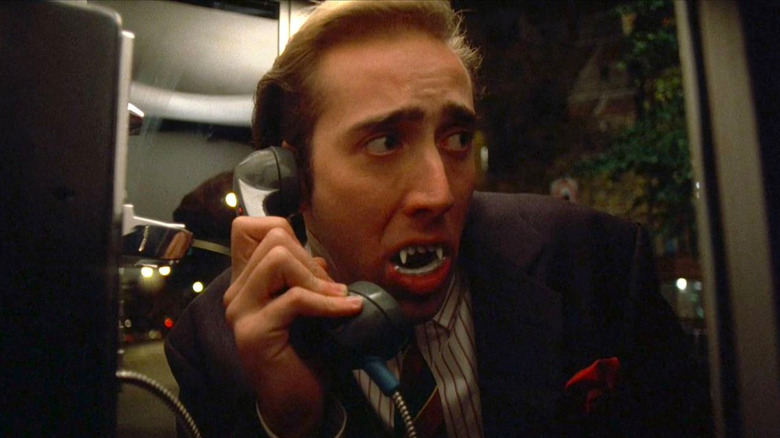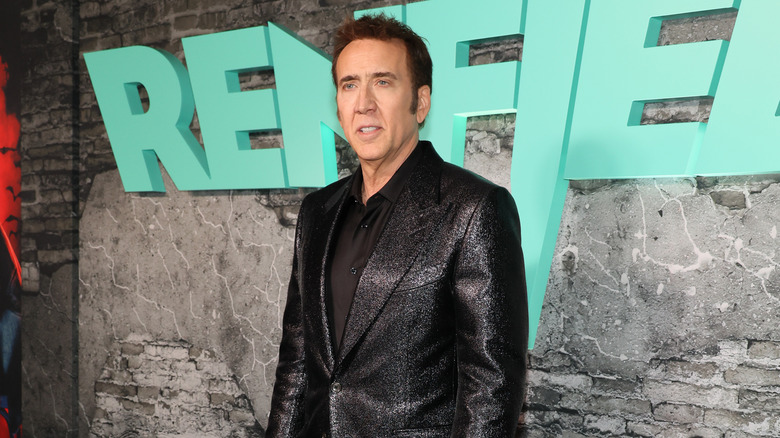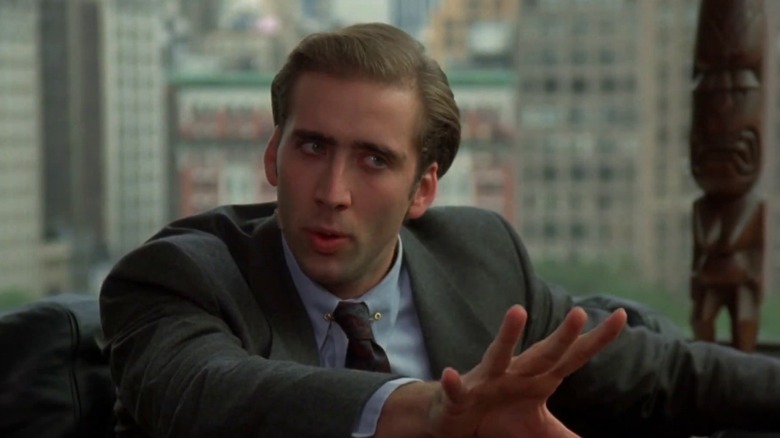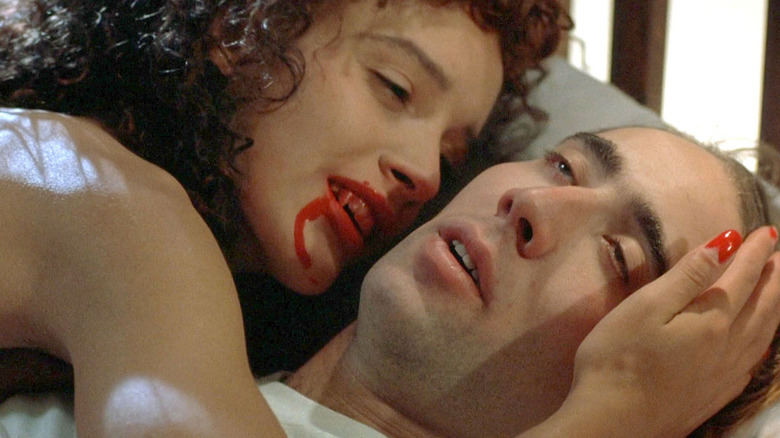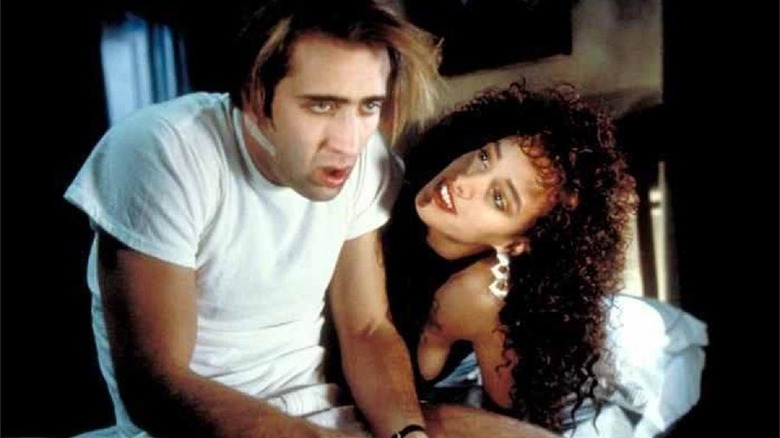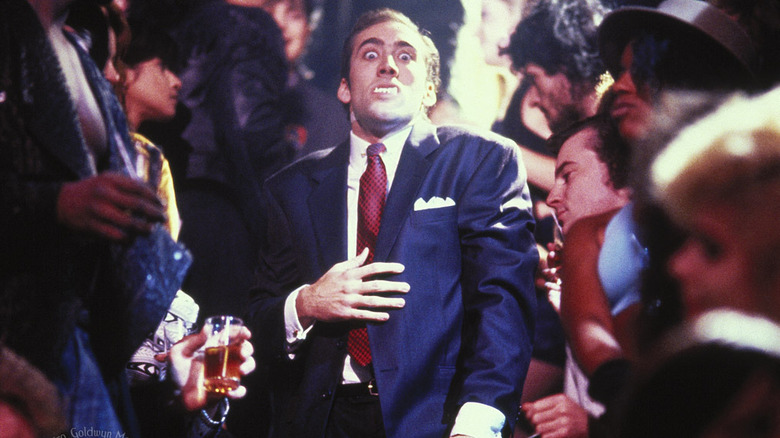Before He Played Dracula In Renfield, Nicolas Cage Went Wild With Vampire's Kiss
It may have taken Nic Cage over 40 years to play Dracula in "Renfield," but he previously donned fangs for one of his most out-there performances in "Vampire's Kiss."
It's kind of surprising that it's taken this long for Nicolas Cage to play Count Dracula. If any actor was born to play the most famous vampire on the planet then surely it was our generation's most unpredictable screen legend. Now he's getting his chance in the comedy "Renfield," where he stars alongside Nicholas Hoult, who plays Dracula's beleaguered goon in the midst of an identity crisis. Cage has always expressed interest in vampire lore. He produced the 2000 film "Shadow of the Vampire," a fictionalized version of the making of "Nosferatu" that imagines what would have happened if an actual vampire had been among the cast. Mostly, however, his highly specific strain of acting has been saved for playing mere mortals. There is an exception to that rule (sort of) in the movie "Vampire's Kiss," which manages to be strange even by the standards of the king of such qualities.
Yes, Nic Cage is a good actor
It's easy to dismiss the work of Nicolas Cage, to decry it as bad or inept. His performances display immense range as an actor but his most infamous work is frenetic, highly committed, and often inexplicably gripping. For decades, he's demanded attention, even if not all of it has been positive. Many are cynical about his process because, even after over 40 years in the business, it's utterly unlike anything his peers are doing. Cage once described his acting style as "Western Kabuki" and "Nouveau Shamanic," more rooted in the likes of German Expressionism than the realism-driven method that has dominated Hollywood since the '50s. Where others aim for naturalism, Cage goes for the extreme, a kind of unpredictability that David Lynch once compared to jazz.
What's most fascinating about Cage's work (and we could be here all day listing his intriguing qualities) is how consistent he's been. There was no mid-career evolution into who we now know as Nic Cage. He was always like that, as evidenced by his feral subversion of the stoic romantic hero in "Moonstruck" and his turn as a traumatized soldier in "Birdy," wherein he yanked out two of his front teeth to prepare for the role. In 1988, still only 24 years old, Cage headlined a curious dark comedy that purported to be a vampire movie but quickly revealed itself to viewers to be something far stranger. Even by Nic Cage standards, "Vampire's Kiss" is a unique one.
How Vampire's Kiss got made
"Vampire's Kiss" centers on a yuppie literary agent whose grasp on reality is tenuous long before he meets a woman who may or may not be a vampire. His drug-addled rants about alphabetizing are so uncomfortable that his own psychiatrist has no idea how to help him. When he has a one-night stand with a woman he's convinced wants him to be a vampire, things only get bleaker from here. The film was written by Joseph Minion, who was best known at the time for the screenplay of "After Hours," the Martin Scorsese black comedy about a bored yuppie who tries to get home one night in the midst of absolute chaos. A minor disappointment upon release, "After Hours" is now considered one of Scorsese's most underrated works, a bleak blend of screwball comedy, film noir, and panic attack that delves into pure Freudian nightmare, albeit with more jokes. It's not traditionally comedic, often more concerned with needling at the audiences' anxieties than their funny bones.
For his follow-up script, Minion wanted to explore his ongoing depression as well as a toxic relationship he'd had with his then-girlfriend, producer Barbara Zitwer. He saw Zitwer as "vampire and destroying him," and he imagined the speculative aspects of a classic vampire tale would fit well into his oeuvre (which is especially raw given that she went on to produce this film). He wasn't wrong. Vampire stories work best when they act as a conduit to explore contemporary ideas and concerns. Minion also wanted to make a New York movie, one with as grim an outlook on the city as "After Hours." Initially offered to Dennis Quaid, perhaps a more traditional leading man than his replacement, the screenplay for "Vampire's Kiss" then fell into the hands of Cage. His own agent tried to coax him into turning it down, believing it to be a poor follow-up to his previous film, "Moonstruck." Of course, few people can tell Nicolas Cage what to do.
Cage's performance is, of course, intense
As Peter Loew, a rich jerk with more issues than a Fangoria subscription, Cage is surreally committed to his acting choices. To paraphrase "Garth Marenghi's Darkplace," he knows actors who use subtext and they're all cowards. This is a part of pure text, of unfettered id that cannot be controlled. For Cage, the core of this character was his smothering isolation, and the idea that one could be so lonely that you could literally go mad. While Cage is known for going off-script, with "Vampire's Kiss," he followed the screenplay to the latter for almost the entire production. That's not to say he performed as the studio expected. He'd never be so predictable. In perhaps the film's most infamous scene, where Peter recites the entire alphabet with the disgusted force of a Baptist preacher railing against Satan, he noted that he planned out his movements "in my hotel room with my cat."
Director Robert Bierman, who is mostly known for working on British television, encouraged Cage's more out-there choices, such as his pretentious transatlantic accent that veers into Transylvanian during his most hectic bellowing. Even he, however, was baffled by Cage's request that, when shooting a love scene with Jennifer Beals, he has hot yogurt poured onto his toes to get him aroused. It was also Cage's idea to eat a real cockroach on camera, which was the only change he made to the script.
What Vampire's Kiss is actually about
It's easy to mock "Vampire's Kiss." It's bonkers, eminently quotable, and the blueprint for the Nic Cage archetype that has been the stuff of memes for many years. If you've seen "Con Air" or the remake of "The Wicker Man" or any of the bad movie night-primed Cage films, you'll recognize that shared energy immediately in "Vampire's Kiss." But it's not a bad movie, certainly not in the way it's been deemed since it opened to terrible reviews and disappointing box office. The film really does exemplify the Cage Method and why it's proven so wildly divisive over the decades. He wanted to shock the audience, to make them feel nauseated by this repulsive character whose fall into madness is nonetheless deeply moving. And he wanted to do it without any sliver of realism in his performance. You can't say he failed when he set the terms so thoroughly.
"Vampire's Kiss" could probably have still worked had Peter been played by, to put it kindly, a more timid actor. Like "After Hours," it's a pitch-black comedy with a scathing view of the much-fetishized misogynistic yuppie culture of the era that's equally fascinated by psychological distress. It's not hard to see Griffin Dunne looking increasingly harried as he becomes convinced he's joined the ranks of the undead. But it's with Cage that the film finds its perfect partner, the one it needed if not necessarily the one its studio wanted. The potency of Cage lies in how he captures something so acutely human, even if it seems over-the-top. Being so utterly and unbearably alone does feel agonizing on a Cage-esque level, as much as we bottle up our emotions and pretend otherwise.
Is Vampire's Kiss actually a vampire movie?
A vampire film can be defined by such by the presence of, you guessed it, a vampire. What form said creature takes is another question. Dracula is a 180 turn from Edward Cullen, who is the total opposite of Nosferatu, who is nothing like Santanico Pandemonium, and so on. Centuries of vampiric lore give creators endless options to pick and choose when telling their own tale. Many of the things we see as requirements of vampirism — an aversion to sunlight, fangs — aren't present in its most iconic stories. That gives "Vampire's Kiss" a lot of leeway to define itself as a vampire film. Sometimes, vampirism is a metaphor. With Peter Loew, it often feels like an excuse.
It's not uncommon to see vampirism as a stand-in for misogyny. So much of "Dracula" makes more sense when read as a dissection of Victorian-era puritanism and how it punishes women for defying the rigid status quo. With "Vampire's Kiss," Peter's contempt for women is akin to derangement, something that has saturated the era and seems primed to explode at any moment. He treats every woman he comes across, from his therapist to his beleaguered secretary to the women he ditches after endless one-night stands, as prey. He cuts his neck while shaving but sees it as a bloodsucking attack from a mysterious seductress who pins him down and leaves him helpless. As he begins to modify his behavior to become more vampiric, including buying a set of plastic fangs that look hilariously cheap, it coincides with his increasing torment towards his secretary, Alva. Peter is so convinced of his vampirism when, in reality, he's just a misogynist whose fear of women has left him isolated beyond hope. That's a pretty nervy story for a 1980s dark comedy with the title "Vampire's Kiss." Clearly, Nic Cage knew that, and committed accordingly. This is the story of an apex predator who is terrified of losing his power, and it nails that frenetic panic with zeal. Look past the memes and descend into its thrall.
